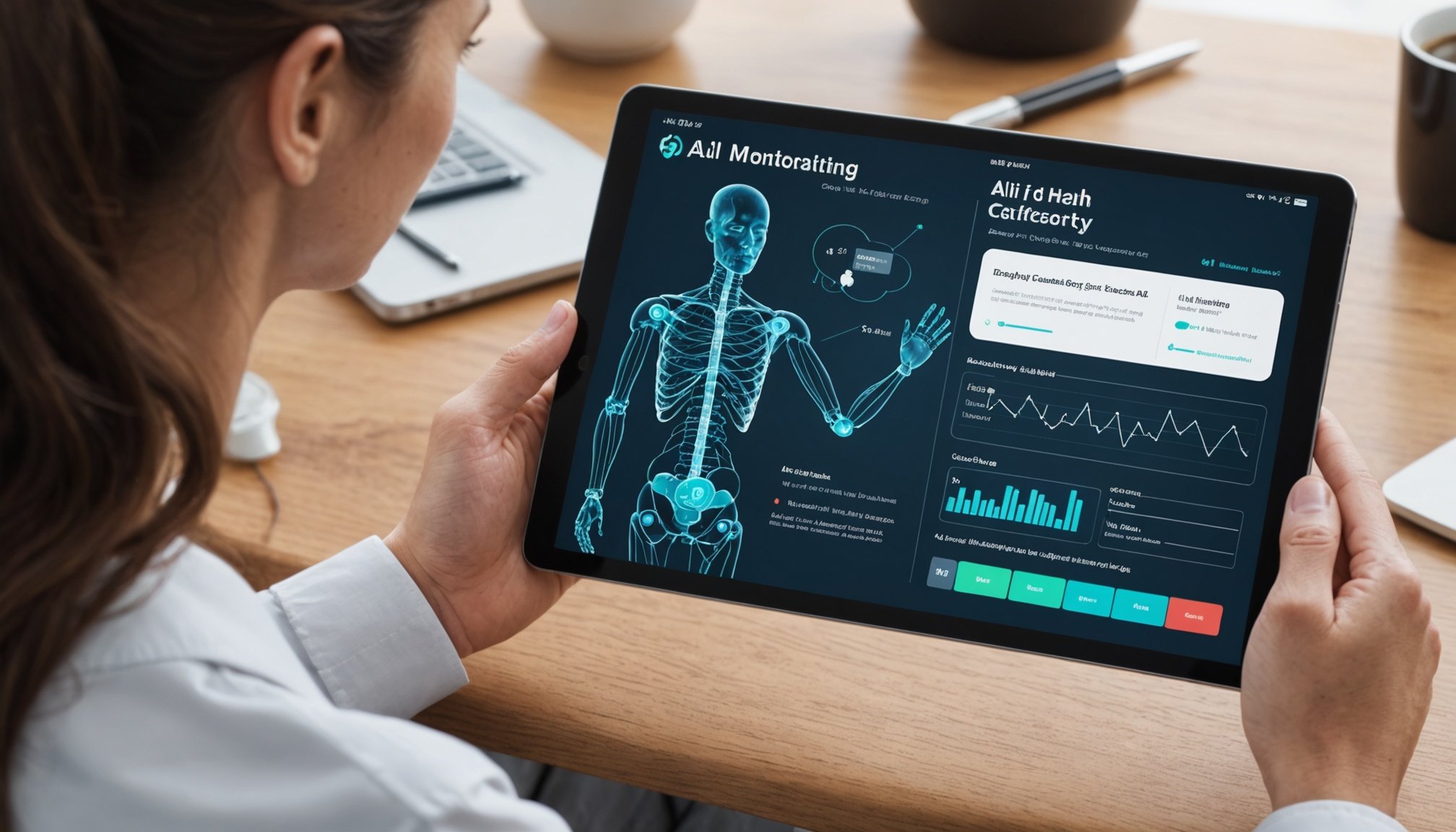Innovative AI Methodologies for Health Tracking
In the ever-evolving world of health technology innovation, AI methodologies for health tracking are transforming how we monitor and improve our health. Personalized algorithms allow apps to offer customized health solutions, tailoring advice to individual needs and circumstances. This personalization is vital, not only for user satisfaction but also for achieving more accurate health outcomes.
Machine Learning Techniques
AI in health tracking extensively uses machine learning techniques. These techniques analyse vast datasets to discover patterns and trends, enabling proactive health interventions. For instance, by identifying behaviours associated with specific health outcomes, apps can suggest lifestyle changes to prevent issues before they arise.
Have you seen this : Innovative Approaches to Seamlessly Integrate AI in Telemedicine Platforms
Predictive Analytics
Predictive analytics in health tracking is particularly potent in managing chronic diseases. By analysing user data and predicting potential flare-ups, health apps can provide timely alerts and interventions. This proactive approach can significantly improve user health, making predictive analytics a cornerstone of health tracking strategies.
Natural Language Processing
Natural Language Processing (NLP) enhances user interaction by interpreting and responding to natural language inputs. It allows AI-driven health apps to engage with users conversationally, offering support and insights in a human-like manner. NLP can also translate complex medical terms into understandable language, enriching the user’s experience and understanding of their health.
Additional reading : Crucial Elements for Developing Next-Generation AI Wearable Tech Apps
Overview of AI in Health Tracking Apps
In the realm of AI in Health Tracking, the current landscape showcases how rapidly health apps are evolving. AI’s integration into these apps capitalizes on the surge of health technology innovation, driving more efficient and personalized approaches. The use of AI enables apps to deliver personalized health solutions, which is crucial for tailoring health advice specific to an individual’s unique circumstances.
The significance of personalization in health monitoring cannot be overstated. It enhances the precision and relevance of health insights, thereby boosting user engagement and satisfaction. AI-powered apps discern patterns in personal health data, offering actionable recommendations that resonate with individual needs.
The benefits of AI in health tracking are manifold. For instance, it accommodates tailored health interventions and boosts the monitoring of vital metrics, enhancing proactive health management. By integrating AI, health apps can offer users a more comprehensive health-tracking experience. They simultaneously monitor, analyze, and provide feedback, creating a seamless user interaction that fosters long-term engagement.
AI’s overarching promise lies in its ability to revolutionize health tracking, providing efficient, accurate, and personalized healthcare solutions that cater to the dynamic needs of each user. This evolution signifies a substantial leap forward in smart health management.
Practical Examples of AI Implementations
AI technology’s role in health tracking is exemplified by several real-world health apps that have integrated AI methodologies to enhance their functionality. These successful implementations highlight how AI-driven solutions can transform user experience.
For instance, apps like MyFitnessPal utilise personalized algorithms to adapt health tracking to individual goals and preferences, offering tailored advice that aligns with user aspirations and feedback. Another example is Fitbit, which integrates AI to provide insights through behavioral pattern analysis, further aiding health prediction and goal attainment.
User experiences indicate a marked improvement in engagement and satisfaction due to these AI enhancements. By continually adapting to user data, AI enables health apps to remain attuned to individual changes and health trends, maintaining a dynamic interaction.
Furthermore, case studies in health tech reveal that AI-driven applications surpass traditional tracking methods in offering more precise, timely, and personalized health insights. AI-powered apps have demonstrated superior outcomes in user retention and health management, underscoring the distinct advantages these technologies portend over conventional approaches. Through these examples, the transformative potential of AI in modern health practices becomes increasingly apparent.
Benefits of Integrating AI in Health Tracking
Integrating AI in health tracking apps revolutionizes user experience by enhancing user engagement and enriching health monitoring capabilities. AI’s impact is profound, elevating user interaction, ensuring data accuracy, and personalizing insights.
Enhanced User Engagement
AI benefits user retention by offering interactive features that foster continuous app usage. Through adaptive learning, AI personalizes interfaces, maintaining interest and relevance for users.
Improved Data Accuracy
The precision of health data is exponentially increased with AI. By meticulously analysing and cleaning vast datasets, AI minimizes errors, resulting in more accurate and reliable health information.
Customized Health Insights
AI personalized health solutions intelligently tailor recommendations, resonating with users’ specific behaviors and conditions. Through data-driven analysis, AI delivers actionable insights, improving health outcomes by informing smarter lifestyle choices.
Moreover, health monitoring becomes more robust as AI algorithms predict potential health changes and alert users, fostering proactive management. This shift to personalization significantly boosts user satisfaction and engagement, underscoring the transformative potential of AI in health tracking.
Incorporating AI ultimately redefines the health tech landscape, making health apps indispensable tools for modern users, who increasingly rely on their integrated, insightful, and precise health management features. This evolution spotlights the critical role AI plays in shaping individualized health monitoring solutions.
Challenges in AI Adoption for Health Tracking
Adopting AI in health tracking poses certain challenges and barriers. While the benefits are vast, the technical challenges are formidable. Developers need advanced resources to design, implement, and maintain AI systems. This often requires substantial investment in both infrastructure and expert talent to keep the technology up to date and efficient.
Another significant hurdle is the ethical considerations tied to user data privacy. Health tracking apps collect sensitive information that, if mishandled, could compromise user trust. Ethical implementation involves stringent data protection protocols, ensuring confidentiality and security at all stages of data handling. This is crucial to maintain trust and assuage privacy concerns.
Users and healthcare professionals might also show resistance to AI adoption due to unfamiliarity or scepticism. Many users worry about the reliability of AI-generated health insights, while healthcare professionals sometimes question the replacement of traditional methods. Overcoming this resistance involves educating both parties about AI’s advantages, such as increased precision and personalization.
Addressing these AI challenges requires a concerted effort from developers, policymakers, and the health community. By ensuring transparent and ethical AI deployment, the full potential of AI in health technology innovation can be achieved, paving the way for smoother implementation and acceptance.
Future Trends in AI and Health Tracking
Current health monitoring innovations signal an exciting transformation in health tech, with AI steadily paving the way. Wearable devices are becoming more sophisticated, leveraging AI to offer precise health insights. These wearable technologies are increasingly integrated with AI to provide continuous monitoring, detecting subtle health changes.
Emerging technologies are revolutionizing real-time monitoring. By analysing real-time data collected from wearables, AI identifies potential health issues, enabling swift interventions. This not only improves accuracy but also allows for timely, data-driven decisions, enhancing overall user engagement and trust.
Telehealth services are another landscape continuously being transformed by AI. AI’s integration into telehealth not only expands its capabilities but also personalizes patient care. This evolution means services are more accessible and tailored to individual needs, promoting proactive health management.
Looking ahead, the future of AI in health tech holds promise for further advancements. These include expanding the capabilities of remote health monitoring and enabling more comprehensive health interventions. As AI continues to evolve, its role in health tracking will likely become more embedded, ultimately transforming healthcare delivery on multiple fronts. The collaboration of AI and health tracking anticipates a continuum of innovations that will redefine health management paradigms.











